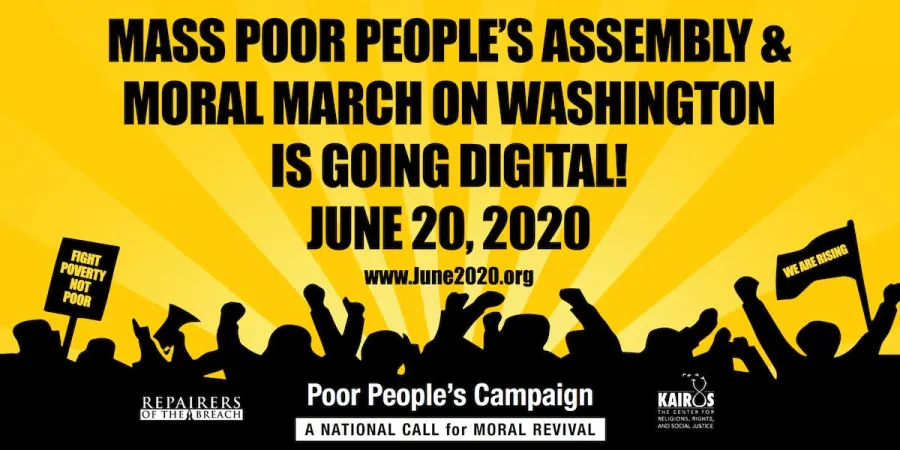Responding to the Pandemic with Equity & Justice: The Poor People’s Campaign

On June 20th, the historic Poor People’s Campaign (PPC), founded by Dr. Martin Luther King Jr., will host a digital march on Washington. Now more than ever, we must confront the inequities our country was built on. In the tradition of the civil rights movement, the Poor People’s Campaign is back to unite us in fighting for every American’s right to live.
What We’re Facing
As we enter summer, peaceful protests against the police murders of Black Americans are being held in each of the 50 states. Americans of all races are confronted with the realities of police brutality and loss of life that have faced Black Americans for hundreds of years. Communities everywhere in this country are organizing.
Bishop William J. Barber II, PPC co-chair, called Americans to look deeply at the systemic racism in our communities and nation, and to commit to building a society with a foundation of love and justice.
“The very life of our democracy is at stake,” he said. “Not the democracy that is, but the democracy that could be.”
At the same time, the COVID-19 pandemic continues to spread suffering and loss of life across our nation, communities, workplaces, and families. And because of the same structural inequity that has created and sustained police violence against our Black families, coworkers, and neighbors, COVID-19 is affecting Americans of color at even higher rates than the general population.
So far, over 100,000 Americans have died from COVID-19—unnecessarily. At the same time, billionaires have profited from the pandemic and hoarded an additional $434 billion dollars. This is the time for action.
A Moral Stand
Some politicians and big business interests are pushing for a reopening of our communities and economy without regard to public health advice. Experts believe that a premature end to staying home and socially distancing will overwhelm our medical system and cause even more deaths.
How will we respond as a nation?
We have to take a moral stand: No one deserves to be sacrificed for the economy, and everyone deserves the right to simply live safely.
It’s not right for Black Americans to fear for their lives while sleeping in our own beds, stopping by convenience stores, or going for a run.
And it’s not right for politicians and corporations to prioritize profit over human lives. Our nation has enough wealth to support states, cities, and towns through this pandemic.
That’s why WFSE is supporting the Poor People’s Campaign. It’s time we reclaimed morality and values as a foundation of the labor movement.
The Poor People’s Campaign: A Legacy of People Power
Staggering unemployment. Mass poverty. A housing crisis.
Sound familiar? These were some of the issues that galvanized Dr. King and his allies as they created the Poor People’s Campaign in the thick of the civil rights movement in 1967. Dr. King realized that while Black Americans were suffering the most from these blights, they had natural allies in other Americans suffering from poverty and lack of dignity: poor white Americans, Native Americans, and Asian Americans. Dr. King dreamed of bringing us all together, and that’s when the Poor People’s Campaign was born.
The Poor People’s Campaign grew out of Dr. King’s determination to create a nation where all Americans were free from the specters of oppression, hunger, and poverty. He envisioned a march of 50,000 people led by Black activists and supported by all. They would join in solidarity, while occupying Washington, D.C., until Congress took action to alleviate poverty.
Just before the PPC’s Poor People’s March on Washington, Dr. King was assassinated.
Despite the loss of one of the civil rights movement’s most visionary leaders, the PPC organizers went on with their mission.
Although far fewer than originally hoped, almost 7,000 Americans united across racial lines and gathered in Washington, D.C. to demand adequate employment, an income for those who couldn’t work, and an end to housing discrimination. They stayed in Washington in a camp called Resurrection City for 42 days before being evicted.
Fifty years later, the PPC has been revived—and once again, it’s time for Americans to stand together in solidarity for our survival.
The Poor Will Be Heard
“On June 20th, we will hold the largest digital and social media gathering of poor and low-wealth people, moral and religious leaders, advocates, and people of conscience in this nation’s history. A global pandemic is exposing even more the already existing crisis of systemic racism, poverty, ecological devastation, the war economy and militarism, and the distorted moral narrative of religious nationalism.”
—The Mass Poor People’s Assembly & Moral March on Washington
We have never faced challenges of this magnitude. Still, we can’t give up. We have to evolve, open our hearts, and recommit to justice. We must center equity and justice in our response to the virus and systemic racism. Together, we can create real change.
How can you join in?
Sign up for digital Stay Home, Stay Alive Campaign.
- Visit the Stay in Place, Stay Alive page to RSVP for the June 20th action.
- Sign a petition to Congress.
- Check out the Digital Toolkit and invite others to join in the work.
Change, liberation, and fair, equitable distribution of resources has never been handed over to working people by those in power. Collective action is how we move forward, how we build better lives for our families and communities, and how we keep each other safe.
Questions about the Poor People’s Campaign? Contact Romy Garcia.
